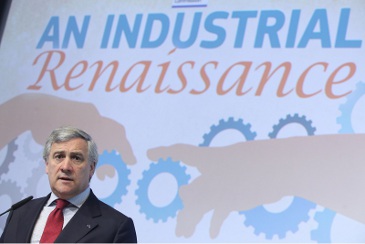Industry and Entrepreneurship
Reindustrialisation
Europe at the Lead of the New Industrial Revolution

More industry means more jobs. In a period of record unemployment in Europe, putting back industry at the core of European policies is therefore an inescapable obligation. The European Commission is promoting a gradual process of re-industrialisation of the European Union, to bring back industry’s weight to 20% of the EU’s GDP by 2020, from less than 16% now.
A new industrial revolution is underway and is changing the way production and assembly lines are organised. A new model based on hyper-customised industrial products is emerging as customers grow increasingly interested in buying goods with unique designs. To ride this new wave, European industry must innovate, protect its most advanced technologies and be as close as possible to its customers. All this makes offshore production in faraway, low-cost (but also lower-technology-intensive) countries more and more obsolete and inefficient.
"Industry is at the heart of Europe and indispensable for finding solutions to the challenges of our society, today and in the future. Europe needs industry and industry needs Europe. We cannot continue to let our industry leave Europe. Our figures are crystal clear: European industry can deliver growth and can create employment. That is why we have adopted a detailed strategy for the re-industrialisation of Europe."
The future is not so different from our glorious past, when Europe was the frontrunner of the first industrial revolution. Despite the ongoing process of restructuring in some sectors, industry is coming back to Europe, and the Commission intends to support this process with all possible means. A new strategy has been devised. It entails easier access to funding, focus on innovation and education, and the removal of the remaining obstacles that encumber the internal market and prevent our manufacturers - especially the smaller ones - from expanding their business outside the EU.
Special attention is paid to foster new ideas and to bring them quickly to the market. Industry is crucial to innovation: 80% of EU private investment in research and development comes from this sector. At the same time, innovation is also crucial to industry: innovation keeps industry competitive. The EU’s strategy therefore includes new funding for innovative sectors, such as bio-based product markets and smart grids, which will help EU industry to make a quantum leap in innovation, with beneficial effects on a wide number of interlinked sectors.
In parallel, the new strategy aims at strengthening the links between research and business. Its objective is to fully exploit the most brilliant ideas of our students and researchers. Europe is world leader in filing patents in a number of sectors, but does not always turns this into an economic advantage. Solar panels are a warning example. European researchers file one third of the patents worldwide, but only 13% of the production is in Europe. We have to put an end to these imbalances.
Bringing back industry to Europe will also profit the environment, as more production lines will come under the EU’s stringent rules to reduce greenhouse gas emissions. Offshoring often permits companies to take advantage of less environment-friendly legislations. Short-term financial cost may be reduced, but long-term damage to our planet increase. Europe opposes this unethical trade-off and calls for the return of energy-efficient and clean industry back home.

